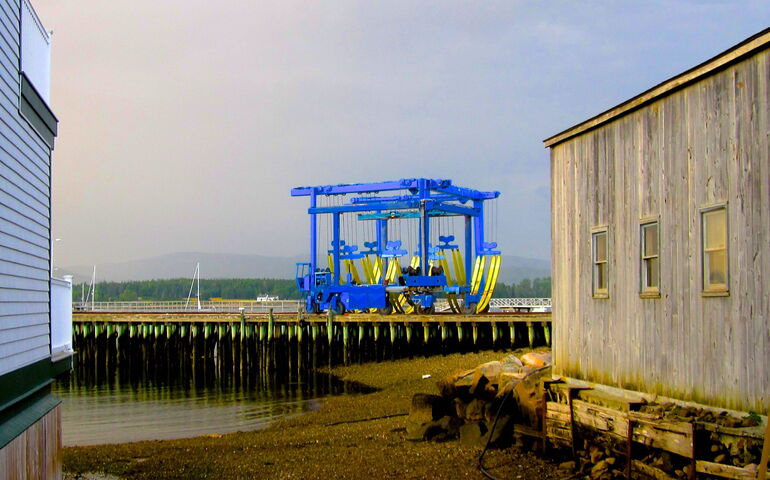Bill would give tax credits to working waterfronts at risk of natural disaster damage
 Photo / Laurie Schreiber
A proposed federal tax credit is envisioned as helping water-dependent businesses to shore up infrastructure against worsening storms.
Photo / Laurie Schreiber
A proposed federal tax credit is envisioned as helping water-dependent businesses to shore up infrastructure against worsening storms.
As state funding winds down to help Maine’s working waterfront damaged by winter storms in December 2023 and January 2024, a federal program could be on the horizon to provide working waterfronts with a 30% tax credit on up to $1 million when they invest in disaster mitigation expenses.
U.S. Sen. Angus King, I-Maine, U.S. Rep. Chellie Pingree, D-1st District Maine, along with U.S. Sen. Bill Cassidy, R-La., and U.S. Rep. Greg Murphy, R-N.C., are introducing legislation to offer a disaster mitigation tax credit to working waterfronts located on the coasts and on navigable waterways, according to a news release.
The goal of the legislation is to ensure that working waterfronts have financial resources to shore up their infrastructure and prevent the often devastating consequences of natural disasters.
“From a warming climate to an evolving economy, the Gulf of Maine is facing challenges that will define our state’s success for generations to come,” said King.
The Working Waterfronts Disaster Mitigation Tax Credit Act would provide working waterfronts along the coast of Maine with financial resources to adapt to “rapidly shifting dynamics of natural disasters affecting economic and tourism operations,” he said.
Pingree called working waterfronts “the economic backbone of many coastal communities — but they’re vanishing under pressure from development and intensifying climate impacts.”
The credit would provide a tool “to prepare for the next disaster, not just recover from the last,” she added.
Working waterfronts comprise physical property, including support structures over water and other facilities, that provide access to navigable waters to persons engaged in commercial fishing, recreational fishing and boating businesses, boatbuilding, aquaculture or other water-dependent business used for the purpose of supporting a water-dependent business.
The tax credit would be available to any small business that operates a working waterfront. For example, a coastal business owner could use tax credit to invest in business-related infrastructure to protect property so it doesn’t suffer damage from rising water and storms.
The Island Institute, a Rockland nonprofit, lauded the proposal.
“Maine’s working waterfront businesses will need all the tools they can get; this tax credit will be an important resource for small business owners, many of whom were affected by catastrophic January 2024 storms,” said Kimberly Hamilton, president of the Island Institute. The tax credit would assure that “small working waterfront businesses can take steps today that will help them to prepare for future impacts of climate change."
Earlier this year, some 40 working waterfront businesses were sharing in the last of Maine's funding for winter storm recovery, with this year’s $2 million in grants representing the last of a $60 million storm relief package approved by state lawmakers last year.













0 Comments